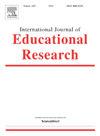Unravelling the persistent school access gap in Cameroon: Which factors matter?
IF 2.6
3区 教育学
Q1 EDUCATION & EDUCATIONAL RESEARCH
引用次数: 0
Abstract
This paper analyses inequalities in access to education in Cameroon with respect to area of residence, household wealth status and the child's gender. The data used are from the Fourth Cameroon Household Survey with a sample of 24,867 individuals aged 3–24. Using the Oaxaca-Blinder decomposition, the results show that a large percentage of the gap in school access in Cameroon is still due to unexplained and unobservable factors. However, raising the educational attainment of rural and poor household heads to the same level as urban and rich household heads reduces inequality in access to education by 21.7% and 29.6% respectively. Being biologically related to the household head reduces the gap in access to education between boys and girls by 49.8%. Immediate education policies aimed at increasing access to education should focus on educating parents through the media about the importance of education regardless of the child's biological link.
求助全文
约1分钟内获得全文
求助全文
来源期刊

International Journal of Educational Research
EDUCATION & EDUCATIONAL RESEARCH-
CiteScore
6.20
自引率
3.10%
发文量
141
审稿时长
21 days
期刊介绍:
The International Journal of Educational Research publishes regular papers and special issues on specific topics of interest to international audiences of educational researchers. Examples of recent Special Issues published in the journal illustrate the breadth of topics that have be included in the journal: Students Perspectives on Learning Environments, Social, Motivational and Emotional Aspects of Learning Disabilities, Epistemological Beliefs and Domain, Analyzing Mathematics Classroom Cultures and Practices, and Music Education: A site for collaborative creativity.
 求助内容:
求助内容: 应助结果提醒方式:
应助结果提醒方式:


